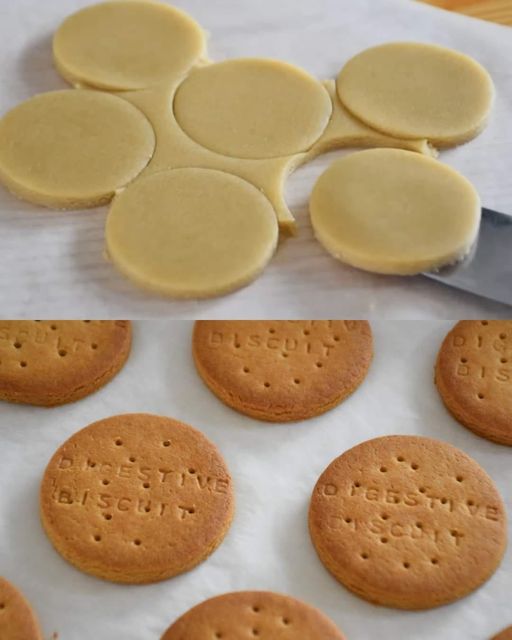ADVERTISEMENT
Prepare the dough:
In a large mixing bowl, combine the wheat flour, powdered sugar, baking powder, and salt (if using unsalted butter).
Add the cold, cubed butter to the dry ingredients. Use your fingertips to rub the butter into the flour mixture until it resembles fine breadcrumbs.
Add milk and form the dough:
Gradually add milk, one tablespoon at a time, mixing until the dough comes together. It should be soft but not sticky. If the dough is too dry, add a little more milk, a teaspoon at a time.
Shape and chill the dough:
Form the dough into a disk, wrap it in plastic wrap, and refrigerate for 15 minutes. This helps the dough firm up and makes it easier to roll out.
Roll out and cut biscuits:
Preheat your oven to 350°F (180°C). Line a baking sheet with parchment paper.
Roll out the chilled dough on a lightly floured surface to about ¼-inch thickness.
Use a round cookie cutter or the rim of a glass to cut out biscuits. Place them on the prepared baking sheet.
Bake the biscuits:
Bake in the preheated oven for 15-18 minutes or until the edges are golden brown.
Remove from the oven and let the biscuits cool on the baking sheet for 5 minutes before transferring them to a wire rack to cool completely.
Serving Suggestions:
Enjoy with a cup of tea or coffee for a classic pairing.
Use as a base for no-bake cheesecakes or as a crunchy topping for yogurt and ice cream.
Dip in melted chocolate for a sweet treat.
Cooking Tips:
Ensure the butter is cold to achieve a light, crumbly texture.
For a smoother dough, avoid overmixing once the milk is added.
Prick the biscuits with a fork before baking to help them cook evenly and maintain their shape.
Nutritional Benefits:
Made with whole wheat flour, these biscuits contain more fiber than traditional cookies.
Lower in sugar compared to many commercial biscuits, making them a healthier snack option.
No artificial additives or preservatives, providing a more natural and wholesome treat.
Dietary Information:
Vegetarian-friendly.
Contains gluten and dairy; not suitable for those with allergies to these ingredients.
Can be made egg-free and suitable for lacto-vegetarians.
Nutritional Facts (per biscuit, approx. 1 of 20 biscuits):
Calories: 90
Protein: 1.5g
Fat: 5g
Carbohydrates: 10g
Fiber: 1g
Sodium: 50 mg
Storage:
Store in an airtight container at room temperature for up to 1 week.
Biscuits can be frozen for up to 2 months; thaw at room temperature before enjoying.
Why You’ll Love This Recipe:
Easy to make with simple pantry ingredients you likely already have.
Customizable—add spices like cinnamon or ginger for a twist.
Perfect texture—crunchy on the outside, slightly tender on the inside.
Healthier alternative to store-bought options, with less sugar and no preservatives.
Conclusion:
These Homemade Digestive Biscuits are a delightful blend of buttery richness and mild sweetness, perfect for any occasion. Whether enjoyed on their own, paired with tea, or used in your favorite dessert recipes, they are sure to become a household favorite. The simplicity of this recipe makes it accessible to everyone, even beginner bakers, and allows you to create a wholesome snack that’s both tasty and satisfying.
Frequently Asked Questions:
Can I make this recipe vegan?
Yes, replace butter with a vegan butter substitute and use plant-based milk.
Can I use a different flour?
You can use oat flour or a gluten-free blend, but the texture may vary.
How do I make the biscuits extra crunchy?
Bake for an extra 2-3 minutes, keeping an eye on the color to avoid burning.
Can I reduce the sugar?
Yes, you can reduce the sugar by up to half, but it may affect the taste slightly.
Can I add flavors to the dough?
Yes, add vanilla extract, cinnamon, or orange zest for added flavor.
Why is the butter cold?
Cold butter helps create a flaky, tender texture similar to shortcrust pastry.
What can I use instead of breadcrumbs?
Rolled oats ground into a coarse flour work well as a substitute.
How do I prevent the biscuits from spreading?
Ensure the dough is well-chilled before baking, as this helps retain their shape.
Can I use brown sugar instead of powdered sugar?
Yes, but it may change the texture slightly and make the biscuits chewier.
Can these be used as a base for other desserts?
Absolutely, they make an excellent base for cheesecake or layered desserts.
ADVERTISEMENT
